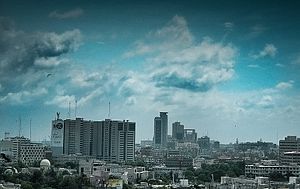Karachi is considered one of the most violent cities in the world. It’s also a city whose political volatility, history of ethnic conflicts, and anti-establishment spirit continue to challenge Pakistan’s stability. Throughout Pakistan’s history, the country’s security establishment has consistently tried to control Karachi’s politics by forming political parties, bringing in insurgent groups, throwing religious parties into the city’s political mix, and using the state’s brute military machine to curtail any dissent. Arguably, though, Karachi and its migrant population, particularly the population that left their homes in various regions of India to travel to the new state of Pakistan after independence in 1947, have never been controlled by the country’s ruling elite.
The elite’s preferred policy has remained aimed at dividing the city’s electoral vote bank to marginalize voices and political parties that don’t agree with the military’s way of managing the city. Currently, another phase of the state-led effort to control Karachi’s political dissent is underway. A few days ago, the military establishment’s latest attempt to merge two different factions of the Muttahida Qaumi Movement (MQM) backfired when both groups publicly announced that the political merger was being enforced by the security establishment. Reportedly, the results of the recent population census in Karachi were maneuvered to conceal correct population numbers for various groups. Rejecting the provisional results of the sixth population census, Dr. Farooq Sattar, the MQM-P chief, said that at least “15 million people are missing in the census results.” With 15 million more people, at least five or six additional National Assembly (NA) seats will emerge in the city and its surrounding regions, which would directly favor the MQM’s electoral strength.
The military has always remained interested in creating a political group that holds political sway over the city and the surrounding urban region’s population. To achieve this objective, from time to time, the military has thrown different political and religious parties into the city’s politics. However, so far, not a single political group created by this political engineering has successfully penetrated the city’s vote bank. Imran Khan’s political party, Pakistan Tehreek-e-Insaaf (PTI), has also been accused of playing the role of a “puppet political group” to manipulate and influence Karachi’s electoral outcomes to support the security organization’s agendas.
For the military, political parties operating in the city remain one of the main challenges when it comes to dealing with the city’s ongoing militancy problem. However, such efforts on the state’s part have done little to change people’s minds about the alleged negative roles of various local political parties, particularly the MQM, in undermining Karachi’s stability. In fact, the migrant population of the city, which by and large supports the MQM, has grown more disillusioned with the state. The migrant population that arrived in Pakistan when India was partitioned in 1947 continues to blame the state for their suffering and deprivation. Consequently, this has only deepened their alienation. They believe that the state is out to isolate them politically and economically and the only way for them to survive is by staying together and supporting political groups that represent their interests, regardless of their questionable role in supporting militant groups in the city.
However, the challenge for the Punjab-dominated ruling elite is that neither Karachi’s local political parties, particularly various cadres of the MQM, nor the provincial government, which is controlled by the Pakistan People’s Party (PPP), is ready to reconcile or submit to the military-bureaucratic establishment’s preferences for managing and running the city. As the next general election draws closer, it’s likely that there will be more intensive efforts to manipulate Karachi and its majority migrant community.
The involvement of law enforcement agencies in the political manipulation of Karachi has turned the city’s politics into a mess. While the last two years of military operations in Karachi have sidelined militant wings of various political parties and terrorist organizations, the existing relative calm in the city remains vulnerable to the state’s ongoing efforts to control the city from the outside.
The state needs to reconsider its heavy-handed approach to dealing with Karachi’s politics, for this approach has only deepened the city’s migrant community’s paranoia that they are still not acceptable in Pakistan.

































